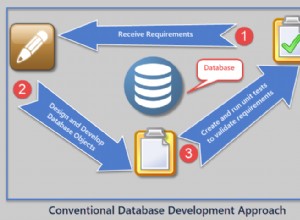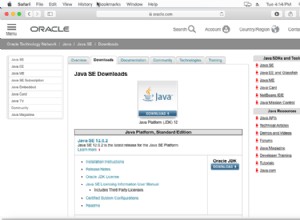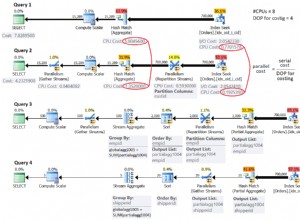Aquí hay un ejemplo simplificado que hice para una pregunta similar relacionada con el rendimiento hace algún tiempo que aprovecha los índices de clave principal agrupados de innodb (¡obviamente solo está disponible con innodb!)
- https://dev.mysql. com/doc/refman/5.0/en/innodb-index-types.html
- http:/ /www.xaprb.com/blog/2006/07/04/how-to-exploit-mysql-index-optimizations/
Tienes 3 tablas:categoría, producto y producto_categoría de la siguiente manera:
drop table if exists product;
create table product
(
prod_id int unsigned not null auto_increment primary key,
name varchar(255) not null unique
)
engine = innodb;
drop table if exists category;
create table category
(
cat_id mediumint unsigned not null auto_increment primary key,
name varchar(255) not null unique
)
engine = innodb;
drop table if exists product_category;
create table product_category
(
cat_id mediumint unsigned not null,
prod_id int unsigned not null,
primary key (cat_id, prod_id) -- **note the clustered composite index** !!
)
engine = innodb;
Lo más importante es el orden de la clave principal compuesta agrupada de product_catgeory como consultas típicas para este escenario siempre conducen por cat_id =x o cat_id en (x,y,z...).
Tenemos 500K categorías, 1 millón productos y 125 millones categorías de productos.
select count(*) from category;
+----------+
| count(*) |
+----------+
| 500000 |
+----------+
select count(*) from product;
+----------+
| count(*) |
+----------+
| 1000000 |
+----------+
select count(*) from product_category;
+-----------+
| count(*) |
+-----------+
| 125611877 |
+-----------+
Entonces, veamos cómo funciona este esquema para una consulta similar a la suya. Todas las consultas se ejecutan en frío (después de reiniciar mysql) con búferes vacíos y sin almacenamiento en caché de consultas.
select
p.*
from
product p
inner join product_category pc on
pc.cat_id = 4104 and pc.prod_id = p.prod_id
order by
p.prod_id desc -- sry dont a date field in this sample table - wont make any difference though
limit 20;
+---------+----------------+
| prod_id | name |
+---------+----------------+
| 993561 | Product 993561 |
| 991215 | Product 991215 |
| 989222 | Product 989222 |
| 986589 | Product 986589 |
| 983593 | Product 983593 |
| 982507 | Product 982507 |
| 981505 | Product 981505 |
| 981320 | Product 981320 |
| 978576 | Product 978576 |
| 973428 | Product 973428 |
| 959384 | Product 959384 |
| 954829 | Product 954829 |
| 953369 | Product 953369 |
| 951891 | Product 951891 |
| 949413 | Product 949413 |
| 947855 | Product 947855 |
| 947080 | Product 947080 |
| 945115 | Product 945115 |
| 943833 | Product 943833 |
| 942309 | Product 942309 |
+---------+----------------+
20 rows in set (0.70 sec)
explain
select
p.*
from
product p
inner join product_category pc on
pc.cat_id = 4104 and pc.prod_id = p.prod_id
order by
p.prod_id desc -- sry dont a date field in this sample table - wont make any diference though
limit 20;
+----+-------------+-------+--------+---------------+---------+---------+------------------+------+----------------------------------------------+
| id | select_type | table | type | possible_keys | key | key_len | ref | rows | Extra |
+----+-------------+-------+--------+---------------+---------+---------+------------------+------+----------------------------------------------+
| 1 | SIMPLE | pc | ref | PRIMARY | PRIMARY | 3 | const | 499 | Using index; Using temporary; Using filesort |
| 1 | SIMPLE | p | eq_ref | PRIMARY | PRIMARY | 4 | vl_db.pc.prod_id | 1 | |
+----+-------------+-------+--------+---------------+---------+---------+------------------+------+----------------------------------------------+
2 rows in set (0.00 sec)
Así que eso es 0,70 segundos frío - ay.
Espero que esto ayude :)
EDITAR
Habiendo leído tu respuesta a mi comentario anterior, parece que tienes una de dos opciones para hacer:
create table articles_to_categories
(
article_id int unsigned not null,
category_id mediumint unsigned not null,
primary key(article_id, category_id), -- good for queries that lead with article_id = x
key (category_id)
)
engine=innodb;
o.
create table categories_to_articles
(
article_id int unsigned not null,
category_id mediumint unsigned not null,
primary key(category_id, article_id), -- good for queries that lead with category_id = x
key (article_id)
)
engine=innodb;
depende de tu típico consultas sobre cómo define su PK agrupado.




